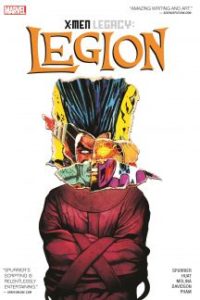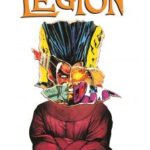 Writer: Simon Spurrier
Writer: Simon Spurrier
Pencillers: Tan Eng Huat (issues 1-3, 7-9, 11, 13-15, 19-20, 23-24), Jorge Molina (issues 4-6), Paul Davidson (issues 10-11, 12 (breakdowns), 16), Khoi Pham (issues 17-18, 21-22)
Inkers: Craig Yeung (issues 1-3, 5, 7-11, 13-16, 19-20, 23-24), Ed Tadeo (issue 20), Jorge Molina (issue 4), Norman Lee (issues 5-6), Walden Wong (issues 5-6), Paul Davidson (issues 10-11, 16), Khoi Pham (issues 17-18, 21-22), Jay Leisten (issues 18, 21)
Colorists: José Villarrubia (issues 1-3, 7-9, 13-15, 19-20, 23-24), Rachelle Rosenberg (issues 4-6, 10-11, 16-18, 21-22), Cris Peter (issue 12)
Letterers: VC’s Cory Petit (issues 1-12, 14-24), Chris Eliopoulos (issue 13)
Cover Artist: Mike del Mundo
Editors: Daniel Ketchum, Jennifer M. Smith (assistant), Xander Jarowey (assistant)
Publisher: Marvel Comics
To those who know me, it’s no secret that I love Legion. And I’m not talking about Legion of Superheroes here, but about the comic character David Haller. If you’re unaware of who David Haller is, he is the son of Charles Xavier (yes, that one) and Gabrielle Haller. He’s an omega-level mutant with the ability of “spontaneous power manifestation,” meaning he gets new powers all the time. However, because this happens at random and he has no control over it, he now has thousands of different powers. This includes about 200 omega-powers (talk about being OP). Bending time and reality is well within his capabilities. It doesn’t stop there, however. Because he’s also schizophrenic and has DID (dissociative identity disorder), an alternate personality is created for every power that pops up. This means that David has thousands of alternate personalities whom he has to keep in check at all times. If one of them takes control, and they turn out to be dangerous, then all hell breaks loose.
X-Men Legacy: Legion
Because he’s a complicated and dangerous character, most comic runs like to paint him as a villain (while he is really an anti-hero). But there is one comic run, which is also the longest, that actually depicts him as a guy with a lot of struggles trying to come to terms with himself while also saving the world. That run is the X-Men Legacy: Legion, written by Simon Spurrier.
Without spoiling too much; X-Men Legacy: Legion is 24-issues long and revolves around David attempting to control the chaos in his head while dealing with his rather rough childhood. During this process he finds that mutantkind as a whole is in danger, and he goes looking for ways to fix it — in his own unique and sometimes questionable way. But for this article, I want to focus less on the actual plot and more on why this arc was such a pivotal story for his character development. For me to explain that, I need to address something many people aren’t aware of: Charles Xavier’s horrible parenting.
David’s Past
David Haller grew up with his mother Gabrielle Haller and his stepfather Daniel. The three of them lived in Paris until David was 10. When David was 10, he and Daniel were involved in a terrorist attack. This attack killed Daniel and triggered David’s latent powers, as well as traumatized him forever. Because of this, he became catatonic and unstable, and Gabrielle could no longer handle him. Thus, Gabrielle brought him to Muir Island, where Moira McTaggert would “take care” of him. Charles was unaware of David’s existence at first. However, when David caused more and more trouble, Charles was called in to help. Long story short, he sort of fixed the problem and now David was a 10-year-old boy in the body of an adolescent. This all happens in the first few comics he was in (New Mutants #25-#28, 1983), and, towards the end, Charles promises that he’ll never let him go — a promise that was quickly broken.
The more that was revealed about David’s powers and his instability, the more other mutants began to see him as a threat. This eventually led to Charles telling Moira to keep David sedated all the time and strapped to a bed. And while Charles’s lack of parenting and neglect was previously hinted at, X-Men Legacy: Legion actually addresses it. It throws it in the face of the reader without sugarcoating it. For me, it was the first time I read a comic where Charles Xavier was (rightfully) called out for his actions. And for anyone who is up to date with House of X/Powers of X, you’ll now have even more horrible insight into Charles and Moira’s original plan for David. It’s just a matter of time before someone addresses that particular subject (or so I hope).
Character Development
Now that you know a bit more about David’s past, let’s discuss the character development in X-Men Legacy: Legion. As I said before, during this story, David is trying to come to terms with himself. He knows he has messed up in the past and he knows he is dangerous. But he aims to fix that. He has been working very hard to confine his most powerful alters in a mental prison. He’s learning to overpower them, so he can actually use their powers when he needs them. But this control quickly crumbles, and he has to start from scratch again.
Because Charles has left him with a lot of self-loathing and feeling like he is a disappointment, he starts working through his issues with Charles. He is also trying to work out issues with his mother, who he feels abandoned him (as she did). He’s homeless, has no friends, and he’s just looking for some peace as well as a place to belong. This struggle finally shows David as a guy who is just human (or well, a mutant, you get the point). You not only see the chaos, insanity, and destruction but also the guilt and the battle for control. He’s not the villain everyone thinks he is; he’s trying. Like, really trying. He’s just been very unlucky. He feels like he has to live up to his father’s legacy and feels like he failed at that. And during the arc, he figures out for himself that he is his own person. He breaks through the self-loathing, and he finds his power and his voice. And he uses it to save mutantkind, much like his father would do, but in his own way.
Why This Run is the Best
I’ve never enjoyed reading a comic run more than I enjoyed reading X-Men Legacy: Legion. It’s not just because Legion is one of my favorite mutants, though. It’s also because, for the first time, I felt like I finally saw the real David, instead of the David everyone thinks he is. I saw a mutant who is aware of what he did and works every day to do better — a guy who knows he’s insane and owns up to it, without letting it rule him. I neither saw the mutant who lost control again, causes mayhem, and blames it all on his mental struggles, nor did I see the lunatic most writers make him out to be. And that’s why, in my opinion, X-Men Legacy: Legion is the best Legion story to date. It gives depth to the character and makes him relatable. And it shows that even the people we think are villains just need a little love and support.



![[ALIEN ANNIVERSARY] RANKING THE ALIENS FILMS – THE DEFINITIVE GUIDE](https://geekd-out.com/wp-content/uploads/2019/05/thexenomorph-150x150.jpeg)
